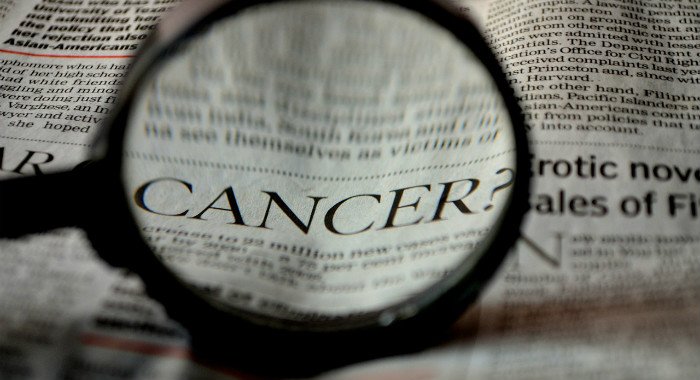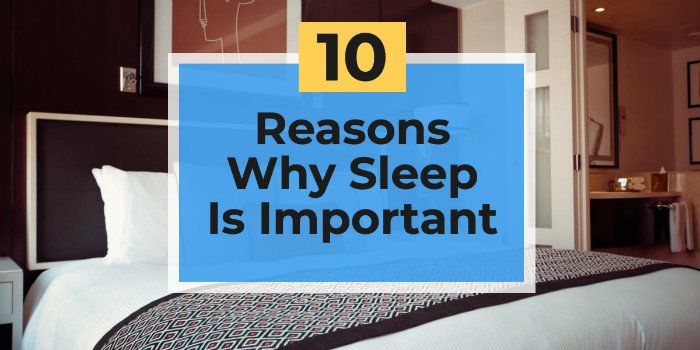Sleep is important for your health. That’s a fact.
It’s something that we’ve all grown up understanding. If you don’t get enough sleep, you won’t have enough energy to make it through the day.
Yet, according to the CDC, 35% of adults don’t get enough sleep. That’s 1 in 3 adults.
Not getting enough sleep won’t just leave you blurry-eyed and eager to put the kettle on. It impacts your health and body in ways we don’t stop to think about.
Well, now it’s time to wake up and face the facts. Here are the top 10 benefits of getting a good night’s rest – and proof of how just how important sleep is.
It keeps your immune system strong
One of the reasons that sleep is important to us is because it helps keep our immune system strong and ready to fight off infections.
That’s because your body makes and produces proteins called Cytokines during sleep. These proteins are what target infection and inflammation in the body, triggering an immune response to keep the bugs at bay.
So when everyone around you starts coughing and sniffing in prime flu season, getting your hours at night is one way to help you stay cold-free.
If you do get ill, sleep also helps you fight off diseases. That’s the reason why doctors will always recommend getting some rest.
It can reduce the risk of cancer

Not only does sleep help keep your immune system strong, but it can also reduce your risk of cancer.
A study found that less sleep can be associated with higher rates of certain types of cancer. This includes breast cancer, colorectal cancer and prostate cancer.
This study was carried out using overnight shift workers, claiming that those who got more than 7 hours of sleep a night had the best mortality rates.
Not much is known about why lack of sleep may increase the risk of cancer at the minute. But animal experiments have also found that disruption to the circadian rhythm for an extended time also caused cancers to grow faster.
It helps you lose weight
Although it may seem like laying down for 8 hours a night will make you gain weight, the opposite is true. Those who sleep more a night are found to gain more weight and have a higher risk of becoming obese.
In fact, 3-5% of adult obesity could be caused by lack of sleep.
The cause is believed to be how sleep affects your appetite. Those who have less sleep are found to have:
- Reduced levels of leptin, which helps you feel full after a meal.
- Increased levels of ghrelin, which makes you feel hungry.
Therefore, if you get less sleep, you’re more likely to feel hungrier and eat more. This is because your body is trying to get the energy it needs, anyway it can.
If you’re trying to lose a few pounds or keep yourself in shape, make sure you’re getting a good night’s sleep.
It reduces the risk of diabetes
For those of you unfamiliar, diabetes is a disease where your body can’t produce or respond to the hormone insulin. Without insulin, you can’t process or store glucose, which is what gives you energy.
If left not correctly managed, diabetes can lead to a number of serious conditions including loss of eyesight, strokes, kidney failure or even a heart attack.
There are two types of diabetes.
- Type 1 is often inherited and diagnosed in children. This is where your body is incapable of making enough insulin that your body needs.
- Type 2 is often generated in later life. This is where your body can produce some insulin, but it’s not able to use it to control your blood sugar levels. This type of condition is linked to lifestyle choices, such as a lack of exercise and an increase in sugary foods.
Having less than 5 hours of sleep a night can be linked to an increased risk of type 2 diabetes.
One reason for this risk could be an increase in sugary foods. If you’re getting less sleep, you may decide to take the sweet route to boost your energy levels throughout the day. This raises your blood sugar levels and increases your risk of diabetes in the long-term.
Lack of sleep changes the way that you processes glucose.
When you haven’t had enough sleep, you can go into a state like insulin resistance. This is where your body can’t use insulin correctly, similar to a lower level of type 2 diabetes. In this state, your blood sugar levels are kept high and can potentially cause damage to your organs, particularly your kidneys.
It may help prevent heart disease

Not getting enough sleep can increase your risk of heart disease. The exact reason for this is unknown, but long-term sleep deprivation is linked to:
- An increased heart rate
- High blood pressure
- Increased levels of inflammation-causing chemicals
All of these can put extra strain on your heart and can lead to heart conditions. In fact, high blood pressure alone is one of the leading reasons for heart disease.
Combined with increased risks of obesity and type 2 diabetes, not sleeping is bad news for your heart health.
It improves your mental health
Everyone who has ever had a night of bad sleep knows how irritable it can make them the next day. But lack of sleep doesn’t just make you grumpy. How much sleep you get is closely linked to your mental health.
Those who get less sleep are more likely to suffer from mental health issues such as anxiety and depression. And to make matters worse, those with mental health issues are also much more likely to suffer from insomnia.
In fact, an estimated 90% of people with depression suffer from poor sleep quality. It’s a vicious cycle that just keeps going.
The more sleep you get, the better your mental health.
It increases your sex drive
Ironically, those that sleep all night might want to stay up all night – as more sleep increases your sex drive.
If you don’t get enough sleep, your sex drive lowers. For men, less sleep can also lower testosterone levels, which also contribute to decreased libido. But this is something that happens to all genders, so it’s not just linked to testosterone levels.
It improves fertility
Good news for everyone trying to start a family, increased sleep doesn’t just increase your sex drive but also improves your fertility.
That’s because sleep disruptions can reduce your body producing reproductive hormones. Without these hormones, you’ll have trouble convincing.
In addition, regular sleep also helps keep your body healthy and reduces stress, which is cited to improve chances of fertility.
It helps increase your concentration

It’s almost impossible to concentrate on a lack of sleep. It’s what your body needs to keep sharp, refreshed and ready to work.
Without it, you’ll be distracted. You’ll make mistakes. There’s no doubt of that.
Here’s a pretty neat fact for you. A lack of sleep can impact your brain function to the same degree as alcohol. Now, just try to remember how difficult some simple tasks seem when drunk. This is what your brain is trying to work with when you’re tired.
Sleep also helps keep your hand-eye coordination in top form and your reactions as normal. Without a proper night’s rest, you’ll be more accident-prone and likely to have an accident.
Although stubbing your toe may feel like the end of the world, these are relatively minor things that can happen whether you’ve had enough sleep or not. Unfortunately, being accident-prone just mean innocently bumping into tables or falling over.
In the wrong place or time, these accidents can be potentially fatal. In fact, 20% of all car crash accidents and injuries are the result of sleepiness. 20%. That 1 in 5 car incidents caused by a lack of sleep.
It helps you look better
Beauty sleep really does exist.
Recent studies have shown that those who get more sleep look more refreshed and more attractive than those who did not. What’s more, those who have more sleep are also shown to develop fewer wrinkles and fine lines, making them look younger.
What happens if I don’t sleep?

This is not an easy question to answer, as it depends on how long you go without sleep.
In some cases, lack of sleep can be fatal if it causes an accident, such as a car accident or falls from height. But generally, your body will reach a point where it forces you to sleep as it physically cannot be awake anymore.
Currently, the world record for staying awake is 11 days.
Here’s what happens the longer you go without sleep.
24 hours without sleep
The effects of sleep deprivation will start showing after just one day without sleep. These include:
- Mood changes, such as feeling irritable and increases stress.
- Lapses in concentration and problems with short term memory.
- Reduced coordination and a higher risk of accidents.
- Impaired judgement
- Increased blood sugar levels
- Muscle tension
The CDC also states that staying awake this long is comparable to having a blood alcohol content (BAC) of 0.10% which is over the legal driving limit.
36 hours without sleep
This is where your health becomes more at risk from sleep deprivation. This is where you have high levels of inflammatory markers in your blood, which contribute to high blood pressure and heart disease.
In addition, you’ll suffer from more mood swings. Your short-term memory also becomes more affected at this point, leaving you with blank hours that you cannot recall.
48 hours without sleep
The more time goes on, the worse the symptoms get.
At 48 hours, the body also starts entering brief moments of microsleep. This is an involuntary way of becoming completely unconscious. Microsleeps can last from a single second to half a minute.
After a microsleep, you will be disoriented and not aware of what just happened.
72 hours without sleep
After 72 hours without sleep, even the most simple of tasks will feel like hard work. In fact, you’ll find it difficult to hold a single conversation.
It will be extremely hard to concentrate on anything and will have more gaps in your memory.
At this point, you are also more likely to suffer from hallucinations. Your mood will also fall and can lead to a depressed or paranoid state.
How much sleep do I need a night?

How much sleep you need a night depends on your age and the lifestyle that you live. According to the National Sleep Foundation, the guidelines for how much sleep is needed are:
- 0-3 months old: 14-17 hours a day.
- 4-11 months old: 12-15 hours a day.
- 1-2 years old: 11-14 hours a day.
- 3-5 years old: 10-13 hours a day.
- 6-13 years old: 9-11 hours a day.
- 14-17 years old: 8-10 hours a day.
- 18-25 years old: 7-9 hours a day.
- 26-64 years old: 7-9 hours a day.
- 65 years and older: 7-8 hours a day.
Not all sleep is equal
Our bodies don’t just switch off when we fall asleep. We go through different stages of sleep, all of which are important for helping different parts of our bodies and minds.
These stages are broken down into two key types: REM (Rapid Eye Movement) sleep and non-REM sleep.
REM sleep is where the most brain activity happens. It’s named because when you’re in this sleep, your eyes will be rapidly darting from side to side underneath your eyelids.
REM is a type of deep sleep that happens at the end of the sleep cycle. During this stage, your mind is flooded with images, sounds and other messages, which influence your dreams. It’s thought that this stage is most important for processing emotions, thoughts and memories.
Non-REM sleep is where your body recovers and recharges.
There are 4 stages of Non-REM sleep, which range from light dozing as you’re drifting off to a full, deep, restful sleep. During this, your body temperature will cool, your muscles will relax and your breathing and heartbeat will slow down.
To get a good night’s sleep, you need to cycle through the stages of Non-REM and REM sleep. Each cycle takes roughly 90 minutes to complete and will happen on average 4-6 times a night.
Let’s Recap: Why Is Sleep Important?
Sleep is important because it’s where our mind and body get a chance to rest, recover and re-energise for the next day. In addition, it’s also where we process emotions and memories, which make us who we are.
Without proper sleep, you risk damaging your health, mood and ability to complete your everyday tasks.
It’s a simple bottom line. If you want to keep yourself in tip-top condition, you need to get a good night’s sleep.
